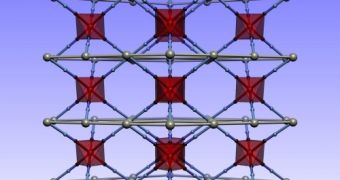As we all know, most of the known materials expand while being heated and contract when suffering a cooling process. However, a small number of substances, such as water and bismuth, experience an anomalous behavior, meaning that they have negative expansion indexes and expand when cooled and contract when heated. Recently, a team of researchers from the University of Cambridge discovered that a silver, cobalt, carbon and nitrogen compound could suffer an expansion far greater than any other material while been cooled.
Silver(I)hexacyanocobaltate compound and negative thermal expansion material in general experience contraction along one or more crystal axes, while positive thermal expansion materials behave in the exact opposite way. Measurements made on the crystal lattice, by implying X-ray diffraction techniques, reveal that the Ag3Co(CN)6 compound has a thermal expansion index along one axis, close to -120 x E-6 1/K, more than 14 times greater compared to the previous record holder, a zirconium tungstate compound.
To make things even more interesting, when heated the material again suffers an expansion along the other axes, reaching thermal expansion indexes of 140 x E-6 1/K, more than 10 times compared to any other previous material. This basically means that the silver hexacyanocobaltate material has an overall axis thermal expansion index larger than 100 x E-6 1/K, becoming the first material to have massive positive and negative expansion indexes.
These properties are mostly due to the crystalline structure of the Co(CN)6 component, which has a configuration that incorporates the silver metal inside it. Chemical bonds between silver and the hexacyanocobaltate crystal are relatively weak, which gives it more freedom to flex when it is heated or cooled. As the material is being cooled, silver first triggers a contraction of the hexacyanocobaltate crystal, after which interaction between the ions in the structure forces a rapid expansion.
The new compound may already have a series of applications in stabilizing sensitive devices that work in extreme temperature environment. One of these are optical space telescopes, which often need mechanical correction to counteract the effects of thermal expansion that act on the main mirrors. Because satellites cool and heat up in relative small amounts of time while in space, silver hexacyanocobaltate could be used to minimize the effects of temperature on the mirror and on other similar optical devices.

 14 DAY TRIAL //
14 DAY TRIAL //